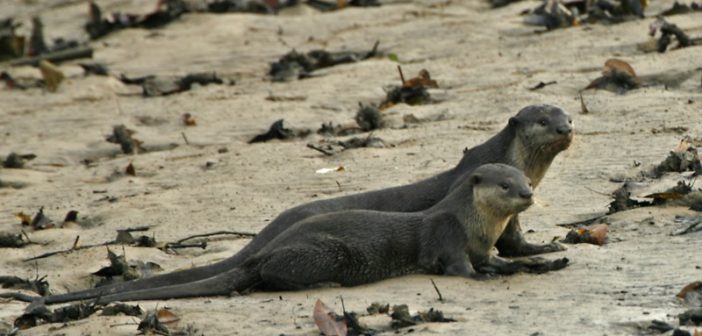Sahabat Alam Malaysia (SAM) was recently heartened to hear from the D’Residence Residents Committee about the presence of otters at their gated community. Being cute and intelligent animals, otters are a sight to behold, and people are fascinated by their antics. Otters making their presence felt is not new. Sea otters reside near the shore, inhabiting shallow coastal waters and occasionally venturing onshore.
Sightings of otters have been commonly reported by the media in Penang. Significantly, the report of a family of 10 smooth-coated otters taking residence in a highly polluted river – the Sungai Pinang – means that fishes have come back. The ‘resurrected’ river has been given a new lease of life, and along with it a family of otters.
The smooth coated otter is listed as vulnerable by the International Union for Conservation of Nature (IUCN), and is totally protected under the Malaysian Wildlife Conservation Act 2010.
While sea otters are vulnerable to natural predators, their populations are significantly impacted by several human factors as well. Direct conflicts with humans, such as entrapment in fishing traps and nets, pose a major threat to sea otter populations.
Many fishermen use fishing gear that can entangle sea otters and cause them to drown. Since sea otters eat many of the same shellfish humans eat, such as sea urchins, lobster and crab, they often find themselves in the same areas fishermen like to harvest. Some shell fishers view sea otters as competition and a threat to their economic gain.
Pollution on land runs off into the sea, contaminating the sea otters’ habitat. This can jeopardize their food sources, as well as harm them directly. Sea otters are often contaminated with toxic pollutants and disease-causing parasites as a result of runoff in coastal waters.
One of the things sea otters do better than any other marine mammal, and possibly better than any other marine animal, is acting as an indicator of the health of the nearby shore marine ecosystem that supports them. They monitor not only ecosystem health, but also diseases and toxins that are harmful to human beings.
SAM is disheartened to learn that the seafront at Bayan Mutiara is being reclaimed for development. Sea otters and other marine life are highly likely to be affected by habitat degradation and loss. Developments such as land reclamation, sewage, dredging, and dumping degrade the environment and take up valuable habitat.
SAM urges the government and the local planning authorities to assess how reclamation projects will impact the otters. The impacts to be considered include habitat loss and degradation in or near water bodies; disturbance to resting and feeding places; disturbance to otters’ usual routes, which may force them to use roads or bridges where they are more likely to be injured or killed; and also changes to water quality which could also affect food sources.
SAM calls for further reclamation projects at Bayan Mutiara to be scrapped, in consideration of the harmful impact they would have on the existence of endangered animals such as sea otters.
Featured image credit Lip Kee Yap, CC BY-SA 2.0





